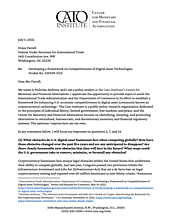Dear Ms. Farrell,
My name is Nicholas Anthony and I am a policy analyst at the Cato Institute’s Center for Monetary and Financial Alternatives. I appreciate the opportunity to provide input to assist the International Trade Administration and the Department of Commerce in its effort to establish a framework for enhancing U.S. economic competitiveness in digital asset (commonly known as cryptocurrency) technology. The Cato Institute is a public policy research organization dedicated to the principles of individual liberty, limited government, free markets, and peace, and the Center for Monetary and Financial Alternatives focuses on identifying, studying, and promoting alternatives to centralized, bureaucratic, and discretionary monetary and financial regulatory systems. The opinions I express here are my own.
In my comments below, I will focus my responses on questions 2, 7, and 14.
(2) What obstacles do U.S. digital asset businesses face when competing globally? How have these obstacles changed over the past five years and are any anticipated to disappear? Are there clearly foreseeable new obstacles that they will face in the future? What steps could the U.S. government take to remove, minimize, or forestall any obstacles?
Cryptocurrency businesses face unique legal obstacles within the United States that undermine their ability to compete globally. Just last year, Congress passed two provisions within the Infrastructure Investment and Jobs Act (Infrastructure Act) that set a de facto ban on legal cryptocurrency mining and exposed over 60 million Americans to new felony crimes. Numerous proposals have been introduced to amend the provisions, with the latter provision having already received a legal challenge from Coin Center. However, both provisions are still set to go in effect soon and leave much of the industry on uncertain ground.

This work is licensed under a Creative Commons Attribution-NonCommercial-ShareAlike 4.0 International License.

